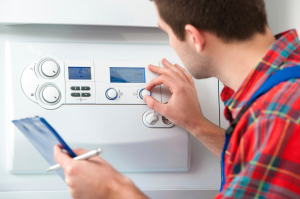
Boilers aren’t one-size-fits-all. You need a model that matches perfectly with the heating and hot water demands of your home.
So if you’re eligible for a boiler grant, it will only prove worthwhile if you install a suitable boiler. This means considering the type of boiler, output rating (its power) and the fuel.
It’s worth noting that only gas boilers are eligible for a boiler grant.
What type of boiler can I install?
There are three types of boiler: combi, system and regular. Depending on the size of your home and level of demand for heating and hot water, one of these will be more suitable than the others.
Combi
A combi boiler delivers heating and domestic hot water on demand as and when needed. This is achieved by heating water directly from the mains and removes the need for any additional tanks or a hot water cylinder.
As well as being great for space-saving, you will also get heating and hot water on demand. However, by not storing hot water in a cylinder, combi boilers are limited in terms of the demand they’re able to meet. So if you live in a property with multiple bathrooms and high demand for hot water then a system boiler would be the better option.
System
A system boiler also heats water directly from the mains but stores domestic hot water in a cylinder. This allows them to meet higher demands for hot water in properties with multiple bathrooms. On the downside, this does mean that you’ll need extra space for a cylinder.
Regular
If you live in a large house that was built in the 1950s or 60s then it’s highly likely that you’ll have a regular boiler. These heating systems go by many names: regular, conventional, open-vent and heat-only to name a few. No matter which name yours goes by, they all work in the same way.
Rather than being connected to the mains water supply – like combi and system boilers – a regular boiler is fed water from a cold water tank in the loft. This water is then either heated by the boiler to warm up the radiators or stored in a hot water cylinder where it’s kept warm until a tap, bath or shower is turned on.
Condensing or non-condensing
One of the main aims of the boiler grants scheme is to replace old inefficient non-condensing boilers with modern condensing heating systems. Condensing boilers use less fuel than a non-condensing boiler and heat the home more effectively. So if your home is currently heated by a non-condensing boiler then you could stand to benefit greatly from a new boiler.
And there’s no need to worry about whether your new boiler is condensing as all new boilers installed in the UK must be condensing.
Get output rating right
The output rating, otherwise known as the size of the boiler, shows the power of the heating system. Measured in kilowatts (kW), it’s important to install a boiler with an output rating that suits the demands of your home. Don’t get fooled into thinking ‘the more powerful the better’ as this could see your heating bills shoot up.
Use the table below as a guide for getting the output rating right for your new boiler.
| Type of property | Bedrooms | Bathrooms | Radiators | Approximate boiler size |
|---|---|---|---|---|
| Small house or flat | 1-2 | 1 | Up to 10 | 24-27 kW |
| Mid-sized home | 2-3 bedrooms | 1 | Up to 15 | 28 – 34 kW |
| Large home | 4+ | 2+ | Up to 25 | 35kw-42kw |
What about fuel?
As we’ve mentioned, boiler grants are only available for gas boiler replacements. This means that you can’t apply if you’re looking for a boiler that runs on oil, LPG or electricity.
Natural gas can only be supplied to properties connected to the gas network – which is around 80% of all UK homes. For off-grid properties, the most popular alternative fuels include oil and LPG.
Can I fund a back boiler replacement with a boiler grant?
Back boilers are dated heating systems that were common in the 1960s and 70s. They were large units installed out of sight behind a gas fire or stove. If you have a back boiler you should get it replaced as soon as possible. Modern condensing boilers are far safer, more compact and will help to lower your heating bills.
As back boilers are outdated, it can be tough to find a heating engineer to carry out the replacement.
Am I eligible?
Boiler grants are available to homeowners and private tenants who are receiving certain benefits.- Armed Forces Independence Payment (AFIP)
- Attendance Allowance
- Child Benefit *
- Child Tax Credits
- Constant Attendance Allowance
- Disability Living Allowance (DLA)
- Income-based Jobseeker’s Allowance (JSA)
- Industrial Injuries Disablement Benefit
- Income-related Employment and Support Allowance (ESA)
- Income Support
- Pension Credit Guarantee Credit Element
- Personal Independence Payment (PIP)
- Severe Disablement Allowance
- War Pensions Mobility Supplement
- Working Tax Credits
How to apply
Applying for a boiler grant is as simple as completing this online form. Soon after, we’ll give you a quick call to confirm a few details to check that you’re eligible, including:- Benefits you receive
- Annual household income
- Number of children living in your home
- Whether you’re a homeowner or private tenant




